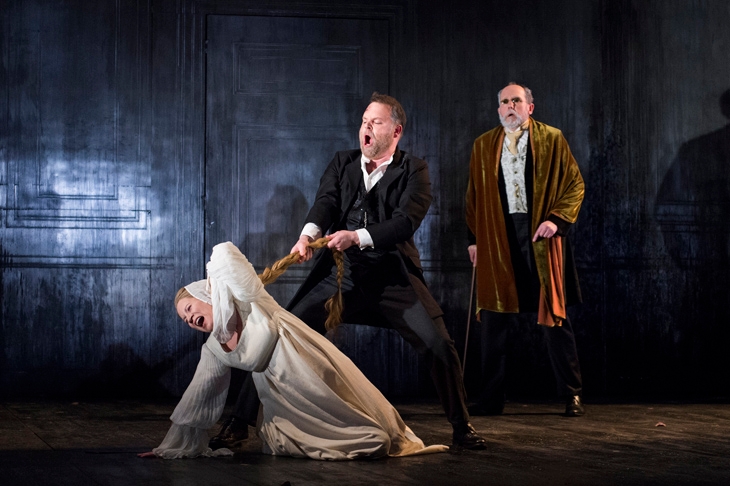‘Perhaps in this world nothing ever happens without purpose,’ sings old, blind King Arkel in Debussy’s Pelléas et Mélisande, and that at least is something to hold on to. God knows, you need it. Peel away the fairy-tale trappings of Maeterlinck’s original play, and the world of this opera is profoundly cruel. Its characters are often passive observers of their own fate (Pelléas admits before his final scene that he’s never yet returned his beloved Mélisande’s gaze). And yet Debussy pretty much compels you to feel for them, in a score of all-but-unbearable tenderness and beauty. It’s only once you’ve left the theatre that, wrestling with the pieces of this ravishing, troubling puzzle, you realise that it’s either insoluble — or that it offers a message bleaker than any Gotterdämmerung.
Wisely, David McVicar’s new production for Scottish Opera leaves its options open. The cast wears Edwardian costume of the operatic variety — the sort where men in frock-coats carry huge medieval swords. Advance publicity suggested that the production would be inspired by the paintings of Vilhelm Hammershoi and the programme duly reproduces a couple of chilly Nordic interiors. Someone clearly got the memo about Scandi chic being over, though, because the sets looked nothing like that. Tree trunks poke through the floors of designer Rae Smith’s decaying mansion; floorboards lift to reveal stagnant pools and the walls shimmer with gold and silver. McVicar and his lighting designer Paule Constable respond with moments of visual wonder to match Maeterlinck and Debussy’s imagery of light and water: doves become ominous, fluttering black forms, and a vengeful Golaud quietly appears, just as Mélisande predicts, at the end of her shadow. McVicar is sometimes dismissed as a safe pair of hands. But here he demonstrates that a staging can illuminate the story without being clunkingly literal, while leaving generous scope for the performers to give of themselves.
That, compellingly, is what Carolyn Sampson did as Mélisande. Dressed in white, with a voice that (like Debussy’s score) seemed lit from within, she trod a remarkably controlled line between impassive and impulsive; the unignorable focus of every scene in which she appeared. Andrei Bondarenko, as Pelléas, sang with a tremulous ardour that was fascinatingly at odds with his pale stage presence — and markedly different from the handsome baritone of Roland Wood’s Golaud, a piece of vocal characterisation that pointed up the gulf between the character’s motives and actions, at least until his smooth tone curdled and broke in the quietly devastating final scene.
At moments like that — when superficial beauty disintegrated under extreme emotion — this performance showed its teeth. Mélisande’s sobs and Arkel’s anguished rasp of ‘Golaud!’ felt brutally real. Add to that Stuart Stratford’s conducting — rich and passionate, Debussy in oils rather than watercolours — and this felt like a particularly physical, even raw Pelléas et Mélisande. But McVicar’s productions have a habit of maturing. This one deserves a long life, and will surely continue to yield new insights with successive conductors and casts. Before that, though, a final word for Cedric Amamoo, as Yniold: a boy soprano whose musicality and alertness to the text would shame many adult singers. He’s a former chorister of the Chapel Royal, and it’s meant as a compliment to say that I wouldn’t have guessed.
In Birmingham, meanwhile, the only real disappointment in the CBSO’s concert performance of The Yeomen of the Guard was that it was a one-off. This was a semi-staging, with colourful costumes, rudimentary direction and a huge (and superb) student chorus. But it proved in heroic style a truth that we apparently keep having to relearn about Gilbert and Sullivan — namely, that if you cast these operas with first-rate artists, G&S’s supposedly stereotyped characters will suddenly flood with humanity. Catherine Wyn-Rogers, in majestic voice, was Dame Carruthers; Sarah Fox’s luminous Elsie played heartbreakingly off Simon Butteriss’s birdlike, increasingly frantic Jack Point, and Bozidar Smijanic’s sunny bass-baritone transformed the jailer Shadbolt from comic grotesque to a credible (if doltish) love interest. Presiding over it all, compassionate and grizzled, was Sir Thomas Allen as Sergeant Meryll.
John Wilson conducted. If you’ve heard him with his own orchestra (and if you haven’t, you’ve lived only half a life) you’ll be able to imagine the vitality and colour he finds in Sullivan’s music — how naturally he shapes its phrases, warms the inner voices and generally makes The Yeomen of the Guard sound exactly what it is: a masterpiece, glaringly overdue for a full professional staging from a director who’s alert to its pain as well as its humour. The capacity audience, meanwhile, spoke for itself. If the UK’s operatic taste-makers were less philistine, our major companies would be staging G&S every season. And they’d be queuing up to get John Wilson to conduct it.






Comments